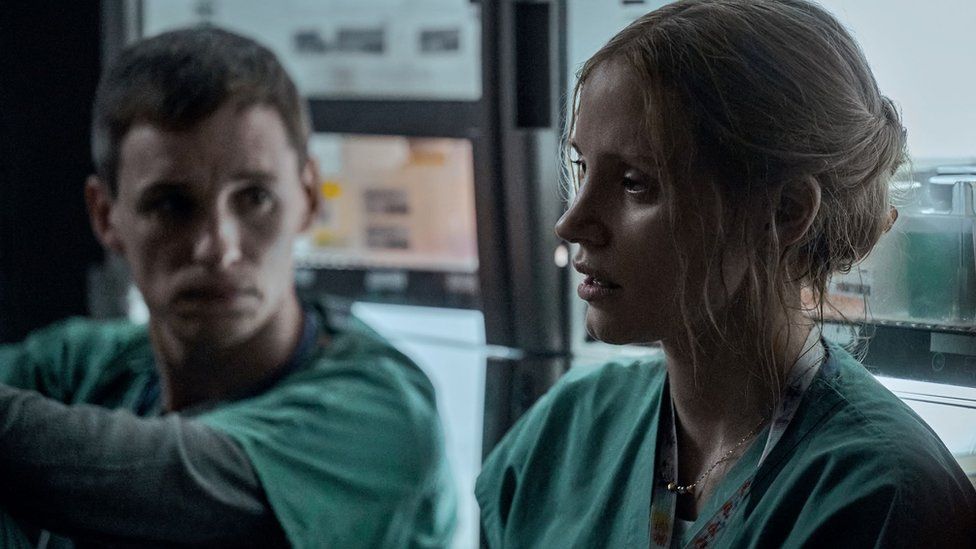ARTICLE AD BOX
 Image source, Netflix
Image source, Netflix
Amy (played by Chastain) is initially glad to have a friend beside her while working night shifts on the ICU ward
By Emma Saunders
Entertainment reporter
You have a couple of hours to kill. A friend suggests you catch a new Hollywood film about one of America's most prolific serial killers, starring two A-list actors. Another procedural thriller to while away a dark autumn evening? Go on then.
But while Tobias Lindholm's The Good Nurse is definitely not short on psychological tension, this isn't your typical sensationalist murder mystery fare.
Based on the book of the same name by journalist Charles Graeber, the film's narrative focuses on the true story of how nurse Amy Loughren helped put a stop to the heinous actions of fellow medic and friend Charles Cullen, who killed dozens of patients in his care over more than a decade while working at several US hospitals.
Loughren and Cullen are played by Oscar winners Jessica Chastain and Eddie Redmayne. While Redmayne delivers a menacing and nuanced turn as the disturbing killer, the film's cornerstone is the heroism displayed by Chastain's character, a single mother suffering from a life-threatening heart condition while working in a physically and mentally demanding job, albeit one she loves.
Chastain says that angle was what attracted her to the film: "Normally we fetishise violence and murder and we [have a] need to really explore the individual who was responsible for it. But what if we explore the individual who stops it? I find that so healing, and it is a radical act of filmmaking."
She adds: "I've lost someone very close to me. And when you've lost someone… how could another person do a story and entertain on [the topic of] death?"
Image source, Netflix
Image caption,Money was a struggle for Loughren, as was finding time to spend with her daughters
Loughren formed a close bond with Cullen while they worked night shifts together at Somerset Medical Centre in New Jersey in the early 2000s. He helped her with childcare, and covered for her when she suffered severe breathlessness due to her heart condition. He was her confidante.
After several suspicious deaths at the hospital led to an investigation, police asked Loughren to assist them. She provided them with evidence and ended up playing a crucial role in extracting Cullen's confession. However, accepting a close friend could have committed such terrible crimes took its toll.
Loughren, who is now doing well following experimental heart surgery 18 years ago, says: "I struggled with the guilt of missing him [Cullen]. I struggled with the guilt of not seeing that that friendship also had a monstrous dark side.
"And I didn't want to see it. I wanted to believe that he was a mercy killer so that I could still care about him. And he wasn't a mercy killer. He was a cold-blooded murderer. And for me to not have seen that, I really did struggle."
She is kinder to herself now.
"I literally risked everything to make sure he was behind bars. And I was showing up every single day and pushing myself every single day no matter how sick I was. I still showed up to be a mom. I still showed up to be a good nurse and watching her [Jessica], I could be proud of that character. It opened up a space for me to say: 'I did good'."
Image source, Getty Images
Image caption,Amy Loughren, pictured at the London Film Festival earlier this month, is now a complementary medicine practitioner
Reviews of the film have been largely positive. The Times critic Kevin Maher gave it four stars, declaring: "Eddie Redmayne shines in this Trojan horse thriller that describes the crimes of a psychopathic hospital predator but is really about the iniquities of the US healthcare system.
The Hollywood Reporter's John DeFore described it as "a gripping but refreshingly un-manipulative true-crime tragedy".
There were a couple of naysayers, however. Screen Rant's Mae Abdulbaki described it as a "run-of-the-mill crime drama that doesn't stand out", while The Slant's Mark Hanson only gave it two stars, writing: "[By the end] Redmayne is raging with such histrionic flair that the film suddenly feels as if it's completely removed from any semblance to reality."
Danish filmmaker Lindholm, who wrote the TV series Borgen and films such as Another Round, says he almost didn't believe Loughren's story when he first read Krysty Wilson-Cairns's screenplay a few years ago. He decided he had to meet the nurse himself to establish if it was really true.
"I met her in New York... and everything was confirmed. On top of that, she was more brilliant than I thought, more human. Her [heart] disease had been much worse [than I thought]."
Lindholm was used to "making films with my nine best friends" in Copenhagen. He had never made a Hollywood studio film before and didn't think he ever would. He had also never made a film in the English language. But meeting Loughran changed his mind.
"Right there, I decided I will do an American film and try to get this to work... to make a story about humanity, about the strength of one individual in this whole system that didn't work."
The system he refers to is the one that allowed Cullen to move from hospital to hospital, giving him the opportunity to commit more murders.
Image source, Netflix
Image caption,Cullen (played by Redmayne) would take an interest in patients who were not on his roster
He was fired from five nursing jobs and resigned from two others because of concerns over his practices.
But over a 16-year career he always found re-employment. It is thought this is partly because hospitals did not share their suspicions about him for fear of being sued.
In the film, the Somerset Medical Centre legal team and risk officer (played by Kim Dickens) try to keep the police at arm's length by insisting they are carrying out a seemingly never-ending internal investigation into any possible wrongdoing.
"As a consequence of Charles Cullen's case, whenever someone is reported, their records now have to be kept for seven years. The fact that that wasn't already happening… it's astonishing," Redmayne says, clearly incredulous.
"The fact he was allowed access to these vulnerable people, it's pretty dumbfounding."
The US healthcare system comes under scrutiny again in the film when it starkly highlights the struggle for some people in the US to access affordable healthcare.
Loughren was too ill to work but was not able to qualify for health insurance until she had worked at the hospital for one year. So she had to keep working against medical advice.
Image source, Netflix
Image caption,Detectives - played by Noah Emmerich (l) and Nnamdi Asomugha (centre) - find it difficult to bypass hospital bureaucracy
In one scene, she is seen scrabbling around for enough money to pay nearly $1,000 (£900) for a heart check-up, eventually spreading it over two credit cards.
While the NHS is under pressure with long waiting lists for routine appointments, pressures on A&E and the ambulance service, and staff shortages, Redmayne suggests we should appreciate what it still offers.
"It made me incredibly grateful [for the NHS]," Redmayne says. "It feels like this film should be seen by British viewers as a warning in some ways. I think it's really important because we take it so for granted. That moment when you see Amy putting it [the medical bill] on two credit cards, I hope it's an eye opener for the British audience."
The final word on the film's intended legacy should perhaps go to Loughren, who is now a complementary medicine practitioner.
"This platform that I have in this moment is really about giving a voice to the victims… because everyone was saying [Cullen] was a mercy killer and they were going to die anyway. No, they weren't. Many of his victims were very young. Many of his victims were about ready to leave the hospital and he stole that from them. And their families deserve that voice."
The Good Nurse will be in selected UK cinemas from 19 October and can be seen on Netflix from 26 October. A documentary based on the story, titled Capturing The Killer Nurse, will also be available on Netflix from 11 November.

 2 years ago
27
2 years ago
27








 English (US)
English (US)